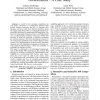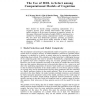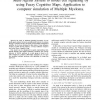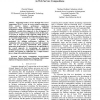769 search results - page 27 / 154 » Reducing the cognitive complexity of business process models |
CSREAEEE
2006
13 years 8 months ago
2006
A world of ever growing competition not only forces enterprises to continuously optimise their private business processes but also to integrate their business processes with their ...
NIPS
2000
13 years 8 months ago
2000
How should we decide among competing explanations of a cognitive process given limited observations? The problem of model selection is at the heart of progress in cognitive scienc...
ECIS
2004
13 years 8 months ago
2004
This paper explores the use of two complementary approaches, each stemming from Personal Construct Theory (PCT), to investigate the interdependence of organizations and informatio...
BIBE
2009
IEEE
14 years 2 months ago
2009
IEEE
—In order to simulate biological processes, we use multi-agents system. However, modelling cell behavior in systems biology is complex and may be based on intracellular biochemic...
ICIW
2009
IEEE
14 years 2 months ago
2009
IEEE
— Supporting business services through Web service compositions (WSC) as part of service-oriented architectures (SOA) involves business performance monitoring requirements. Their...




